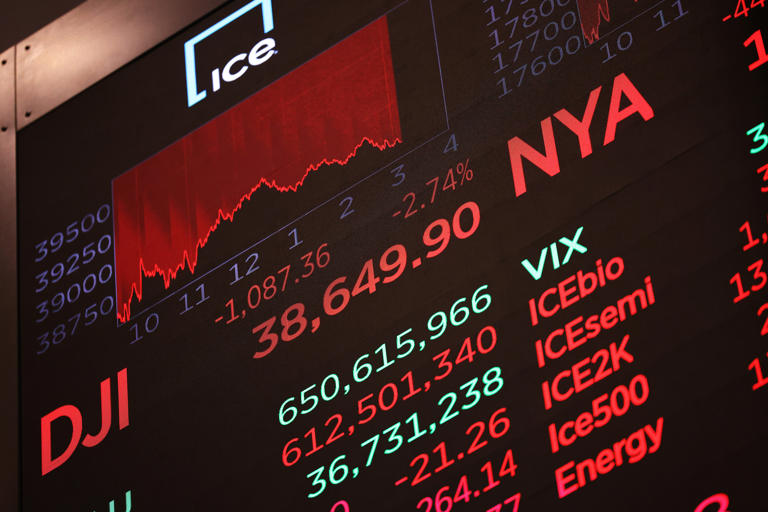The growing anxiety over a potential slowdown in the U.S. economy intensified sharply on Monday, leading to significant declines across Wall Street and international stock markets. This downturn was a direct result of heightened fears about a potential U.S. recession, triggered by disappointing economic data and growing concerns about future economic performance.
The catalyst for this market turmoil was a U.S. Labor Department report released on Friday, which revealed a significant slowdown in job creation. According to the report, American employers added just 114,000 jobs in July, a notable decline from the 179,000 jobs added in June. This unexpected drop in employment figures has fueled fears of a broader economic slowdown, raising concerns that the U.S. economy might be heading towards a recession.
On Monday, these fears were reflected in a dramatic sell-off in U.S. stocks. The Dow Jones Industrial Average, a key indicator of the U.S. stock market’s health, fell by more than 1,030 points, or 2.6 percent, marking one of the steepest single-day declines in recent months. This substantial drop in the Dow was accompanied by sharp declines in other major indices, including the Nasdaq Composite Index, which entered a correction phase last week and saw further declines. The Nasdaq dropped an additional 3.4 percent on Monday, continuing its downward trajectory.
The sell-off in the stock market was exacerbated by concerns about the valuation of major tech companies. High-profile tech giants such as Apple and Nvidia, which had previously driven market gains, came under scrutiny for potentially being overvalued. This scrutiny, combined with broader economic concerns, contributed to the overall market decline.
The sharp declines in stock prices have not only impacted U.S. markets but have also reverberated across global exchanges. Investors worldwide are grappling with the implications of the U.S. economic slowdown and its potential effects on global economic stability. This has led to increased uncertainty and volatility in international markets, compounding the challenges facing investors and policymakers alike.
Amidst the market turbulence, there is growing speculation about the Federal Reserve’s monetary policy response. Economists and Wall Street traders are increasingly predicting that the Fed may need to lower its benchmark interest rate sooner than previously anticipated in order to support the economy and mitigate the risk of a recession. Federal Reserve Chair Jerome Powell has indicated that the central bank is prepared to adjust rates quickly if necessary to stabilize the economy. However, there are concerns that the Fed may have maintained its key interest rate at too high a level for too long, potentially exacerbating the economic slowdown.
Despite the growing fears of a recession, historical patterns suggest that such predictions may prove to be overly pessimistic. The post-pandemic economy has demonstrated a remarkable degree of resilience, with steady growth and robust hiring continuing to exceed many analysts’ expectations. This historical context provides some reassurance that the current market turmoil may be a temporary setback rather than a harbinger of a prolonged economic downturn.
The timing of the market decline is particularly significant as it coincides with the lead-up to the 2024 U.S. presidential election. The market turmoil has become a focal point in the political arena, with former President Donald Trump and Vice President Kamala Harris each using the situation to advance their political narratives. Trump has targeted Harris in a video posted to his Truth Social account, attributing the market decline to her policies and branding it as “Kamala Krash.” Trump has also attempted to take credit for the stock market highs achieved during President Joe Biden’s administration.
In response, the Harris campaign has highlighted Trump’s previous predictions of a market collapse if Biden were elected, contrasting this with his current claims of credit for market gains. The Biden campaign has used this contrast to criticize Trump’s political opportunism and to emphasize the stability achieved under Biden’s leadership.
In the face of this market volatility and political maneuvering, experts are advising investors to maintain a long-term perspective. They caution against panic selling during market downturns, which can lead to greater losses. Historical trends indicate that markets generally recover from severe declines, and investors are encouraged to focus on long-term investment strategies, particularly for retirement savings. Jacob Channel, senior economist for LendingTree, has emphasized that markets have rebounded from worse declines in the past, reinforcing the importance of staying invested through market fluctuations.
As the situation continues to evolve, both market participants and political figures will be closely watching the implications of these economic and political developments. The interplay between economic data, market performance, and political dynamics will likely remain a key focus as the U.S. approaches the 2024 presidential election and navigates ongoing economic challenges.
